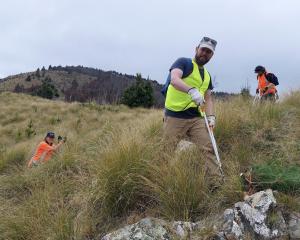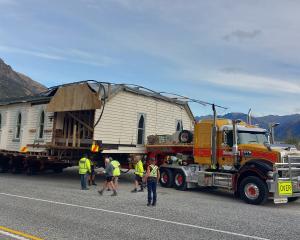Concerns about maintaining recreational access and the wildlife experience in the Mt Aspiring National Park have been raised at the start of hearings on the park's draft management plan.
The draft plan outlines how the national park, the country's third largest, will be managed until 2020, providing guidance on dealing with conflicting demands and increased pressure.
The park, parts of which have world heritage status, extends from Otago to South Westland and is mostly a mountainous terrain popular with recreational users and home to many indigenous species.
A total of 436 submissions was received on the draft plan, 145 of them form submissions related to air access to Bevan Col and another 88 related to jet-boat use in the park.
Yesterday, submitters began to present their views to a panel at a hearing in Dunedin.
Otago Aero Club past president Dave Witherow called for the panel to use separate restrictions for recreational and commercial flyers, and to differentiate between fixed wing and helicopter flying.
"Recreational flying is only a small, very stable part of all the aviation in the back country."
It should be considered alongside other recreational use like tramping and did not have the impact on the environment many other forms of access did, he said.
He suggested a system of issuing permits to recreational flyers could be used to monitor use before restrictions were set.
"Access to these strips is highly valued."
Trampers called for the plan to preserve the park's natural quiet and keep aircraft from remote areas.
Federation of Mountain Clubs' South Island vice-president David Barnes said 90% of the draft plan was good but the clubs did not want to see more commercialism in the park.
The federation did not support allowing more aircraft access into the Forbes Mountains, especially for film crews, as there had been reports of aircraft being "highly intrusive" on trampers' experiences.
Fish and Game Otago environmental officer John Hollows suggested a cap needed to be put on the numbers guides could take into the park to prevent overcrowding, especially in remote spots.
The draft did not allow for recreational game-bird hunting, but Mr Hollows said it was part of the New Zealand recreational experience, "no different from tramping or climbing".
South Island Eel Industry Association consultant Bill Chisholm said while commercial eel fishing was not allowed in national parks, the association wanted the fact it could be in the future to be acknowledged.
• Day 1
What: Mt Aspiring National Park draft management plan hearing
Where: Dunedin
Panel: Department of Conservation staff Ken Stewart (chair) and Bronwyn Hunt and Conservation Board members Gary Nixon and Chas Tanner.
Submitters included: Historic Places Trust, Venture Southland, South Island Eel Industry, Otago Aero Club, Back Country Skiers Alliance, Fish and Game Otago, Federation of Mountain Clubs and Otago Mountain Club.












